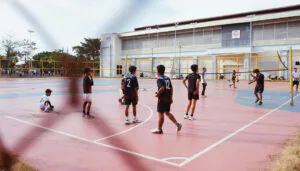Reforming School Sports
There’s a curriculum for school sports teams to support young people’s social skills while learning athletic skills, and to hold coaches as teachers to be accountable for more than wins and losses.

There’s a curriculum for school sports teams to support young people’s social skills while learning athletic skills, and to hold coaches as teachers to be accountable for more than wins and losses.

Read original Edutopia article here. “Mike” is misbehaving in class. The teacher does not want the flow of the lesson derailed. The teacher calls the main office to remove Mike from the room. Assistant Principal “Lee” arrives, determined that Mike be held accountable for the misbehavior, and assigns Mike to an in-school suspension for the […]
Of all the lessons in all the years of schooling, perhaps the most enduring ones come from being a member of a learning community, preparing the next generation to function in families, work places, religious centers, and in the streets of their neighborhoods. In this short video, I discuss making the community, not the individual student, […]

I consulted to a school with students, ages 17-23, who had dropped out of their local high school. They were poor, of many ethnic and cultural backgrounds. Some were homeless; some had kids of their own. Their choice to return to public education was a triumph of optimism and willpower over the conditions of their […]
In this short video, I talk about an essay that inspired me when I first read it decades ago, and continues to be a compass point in my work with people of all ages–because every one of us has a beautiful brain that generates wonderful ideas. At our best in schools, we honor each student for their […]

When we talk about the need for student cooperation, we usually mean we want them to obey us; i.e. the standard for cooperation is doing what they are told. If we want students to truly cooperate, co-operate, they need to know the operating manual of the class. They need to know what they can do, and […]

The epilogue to my 2021 book, “Improve Every Lesson Plan with SEL” stands on its own as an essay. I ask us to ponder how schools replicate or challenge the vast inequalities in our country. I ask: “To what end, to what world view, are we relentlessly pushing students so hard?” I ask us to say the words poverty and capitalism.
With so much to teach, there is constant pressure to move on to the next thing, the next lesson. Here I discuss the value of pausing to ‘dig in’ with a student, and bring their learning to a new level.
Here’s something different: a two-minute video on my realization that I need to be passionate about what I am teaching, versus only doing what I am told to do by a textbook in my hands. By the way, the opening music is from one of my bands.

The first year of the pandemic, when schools went hybrid and remote, was incredibly difficult—a principal said that he felt like he was juggling on a unicycle in a hurricane; teachers felt the same. Every day blew us into unchartered territory. We re-experienced the daily anxiety of being a first year professional—all new, all untested. We did our best to not crash. Kudos to all who hung in.